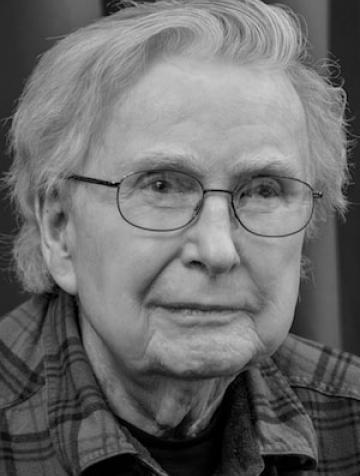Murray Griffin Murphey was Professor of History Emeritus at the University of Pennsylvania.
Murray was born in 1928, in Colorado Springs, Colorado. He got his BA from Harvard in 1949, studying with C. I. Lewis, Perry Miller, and Arthur Schlesinger, Jr. (he babysat for Schlesinger's children). He went on to study for a PhD at Yale in American Studies. In 1953-1954, in a fellowship year, he worked with R. B. Braithwaite, the famed positivist philosopher of science at Cambridge University in England. He returned to New Haven in 1954 to complete his dissertation under the direction of the renowned linguist Rulon Wells. Murray had received a two-year appointment at Penn as a Rockefeller Fellow, and in 1956 he was appointed as an assistant professor of American Civilization, moving up the ranks to a full professorship in 1966. He served as chair of the department for long periods, and for a time edited the journal of the American Studies Association, American Quarterly. Much later he received a life-time achievement award from the Association.
Penn was distinguished in having one of the first departments of American Civilization, with tenure track lines—and not a program, with borrowed faculty. Although initially a combination of literature and history, the Department was re-made by Murray to treat American Civilization as a "discipline." Murray's basic idea was systematically to apply the concepts of the social sciences to the data of the history of the United States. The "data" included conventional sorts of historical evidence from politics, but also literature, material culture, and what is now commonly referred to as social history. Graduate students over the years were trained in the structural-functionalism of sociology, the statistical and quantitative methods being primarily developed in political science, and the cultural approaches of anthropology. But Murray did not neglect the undergraduates in his thriving major. He initiated a stunningly successful year-long lecture course on the American South—AC 7—that was later taught by such luminaries as Drew Faust, Sheldon Hackney, Stephanie McCurry, and Steven Hahn.
Murray wrote several essays and two penetrating books in the philosophy of history, Our Knowledge of the Historical Past (1973) and Philosophical Foundations of Historical Knowledge (1994). His vision of history derived from his comprehensive understanding of the trajectory of philosophy in the United States, which I believe held his deepest interest. His dissertation became his first book, The Development of Peirce's Philosophy (1961). The book was honored fifty years after its publication in a special session of an international meeting of the Charles S. Peirce Society, by which time the Society for the Advancement of American Philosophy had also recognized Murray's career-long accomplishments that the extraordinary book on Peirce had initiated. In 1977 he co-authored, with Elizabeth Flower, the two-volume A History of Philosophy in America. But in his retirement his commitment to philosophical biography became most clear. He wrote C. I. Lewis: The Last Great Pragmatist (2000); and The Development of Quine's Philosophy (2011). In early 2018, after two months in the hospital and shortly after his 90th birthday, he published Thorstein Veblen: Economist and Social Theorist.
Murray's students headed American Studies programs all over the United States, and he also trained a number of important academic administrators, including Robert Corrigan of San Francisco State University, Drew Faust of Harvard, and Richard Freeland of Northeastern. He never really took credit for the decades long impact he had on many scholars. One of his students, Michael Zuckerman, commented at one point that Murray's chief characteristic was his "impenetrable modesty." This gets it right.

